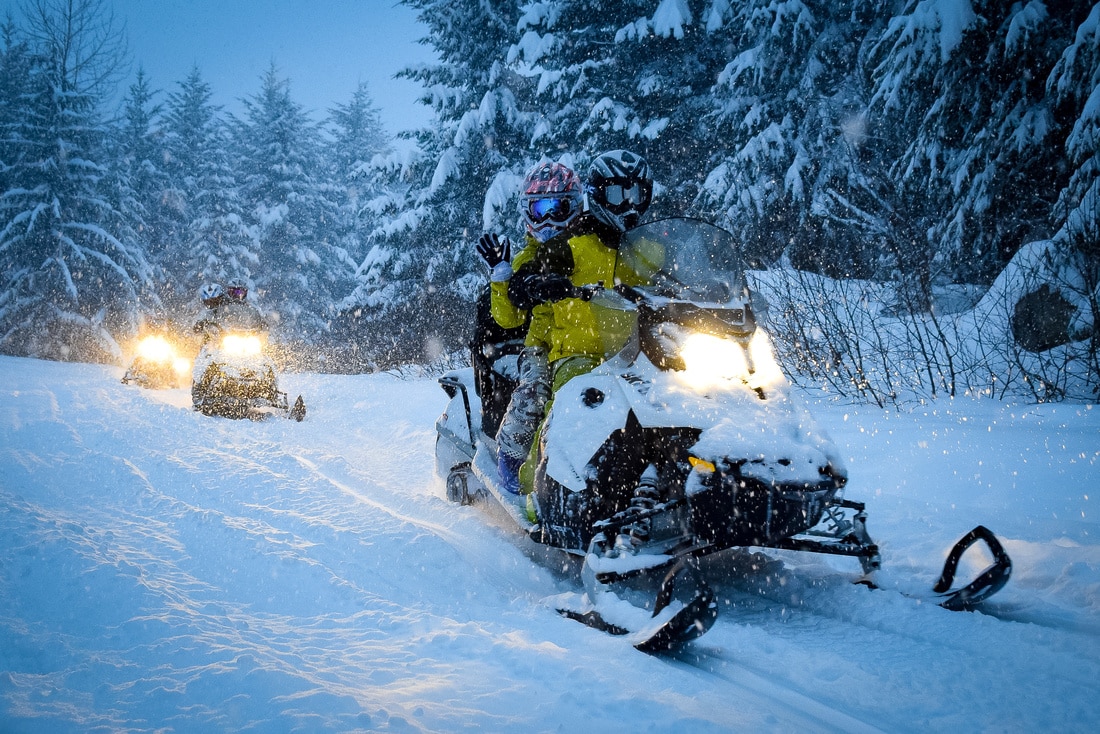How To Protect your Trailers And Snowmobiles From Winter’s Harshness

As proclaimed by the popular medieval themed fantasy TV series ‘Game of Thrones’, “Winter is coming”. While you may not need to worry about an undead army lead mythical creatures known as “white walkers”, winter weather does pose a real threat to the structural integrity and functionality of your trailer. The harshness of the cold that comes along with the winter season in addition to the other elements produced by the temperature drop can cause serious damage to your trailer if not prepped properly.
Even though some trailers are built to transport or store equipment specifically meant to be used during winter, it does not make them impervious to the effects of the temperature change. With all of that in mind, protecting your trailer from winter’s harshness is an absolute necessity to ensure the continued usefulness of your trailer. We have put together some tips to help prevent the untimely loss of functionality that the season can cause your equipment to suffer.
Clean
One of the main destructive forces that goes hand in hand with winter is moisture. With all of our current technology we have yet to create a cost-efficient method for absolute protection from the destructive capabilities of water. Being that the materials we use to build with are susceptible to rust from oxidation or rot caused by water, it is in your best interest to get rid of as much of it as possible from your equipment.
Like people, plants require water to survive and grow, it is because of this that they grow in ways that help them collect as much as they need since they are unable to move as animals do. As you have probably already seen, it is virtually impossible to keep the exterior of any surface in a habitable environment free of plant debris. Leaves and seeds travel far and wide, riding the winds along the path of least resistance until they are stopped by a heavier object or drift to a place that does not allow access to the propulsion the wind provides. Though they are removed from the main body of the plant, the ability to collect water remains and while good for future growth, it can be a destructive force to your equipment.
Leaving leaves and other foliage inside of your trailer can cause rotted wood and rusted metal if left unattended in the winter months. With less heat to vaporize water in the winter, the liquid sits in one spot breaking down the materials from which your trailer is made. A seemingly harmless pile of foliage can cause the need for costly repairs to be done that could have easily been avoided. Any foliage or other moisture collecting items in your trailer should be disposed of or properly contained as soon as possible to help prevent future issues.
Another element that has destructive properties in the winter is salt. Though it is quite welcomed on the roads for melting any ice and snow, it is a real problem for an type of vehicle or trailer.
Part of the upkeep of your trailer should be to periodically wash off all the salt from not only the visible parts but also from the underbelly of any vehicle or trailer. Doing so will decrease the chances of deterioration and rusting.
Inspect
Even though the exterior of your trailer is better suited to deal with the elements than the interior, it is not invincible. Paints used on most trailers are engineered to protect the raw materials of the trailer and typically do a great job. Like with anything else, use of your trailer can cause weak spots to form in the paint, allowing for moisture to contact the bare surface and start to damage your investment.
Most damage starts at moving parts since it is their ability to move that requires them to not be sealed. Once moisture makes its way into the moving parts of a trailer, it can freeze which expands and can cause warping of the sheet metal. With the extra room made by the expansion of water as it becomes ice, more moisture is allowed to enter and rust will soon follow.
To help fight this destruction, it is good practice to keep some touch up paint and rust remover (such as Naval Jelly) on hand. Regularly inspecting your equipment for any signs of rust can help improve the longevity of your investment if you take care of the issue before it spreads.
Store
Not everyone has the ability to store a storage trailer indoors. When you are not using your trailer during the winter months, proper storage can be beneficial for preventing any of the issues mentioned earlier as well as other risks. If you do not have access to an indoor storage area for your trailer, your next best bet is to purchase a quality trailer cover.
It may be enticing to use a regular tarp from your local hardware store, but they can often do more harm than good. Trailer covers are made to prevent moisture from building up which, as previously described, can do a lot of damage. Tarps may be useful for many different situations, in this case they are more suited to trap moisture on and in your trailer which defeats the purpose you had hoped the tarp would serve initially, protection.
In addition to rust and rotted wood, the cold months can do damage to your seals and tires as well. Moisture on seals can cause deterioration as the water expands to its solid state. Once enough damage is done to the seals, they are no longer able to perform their job and can allow for water damage to spread inside your trailer. All of these reasons should be suitable to warrant the purchase of a well made trailer cover, a little extra spent early on can save you a lot more down the road.
